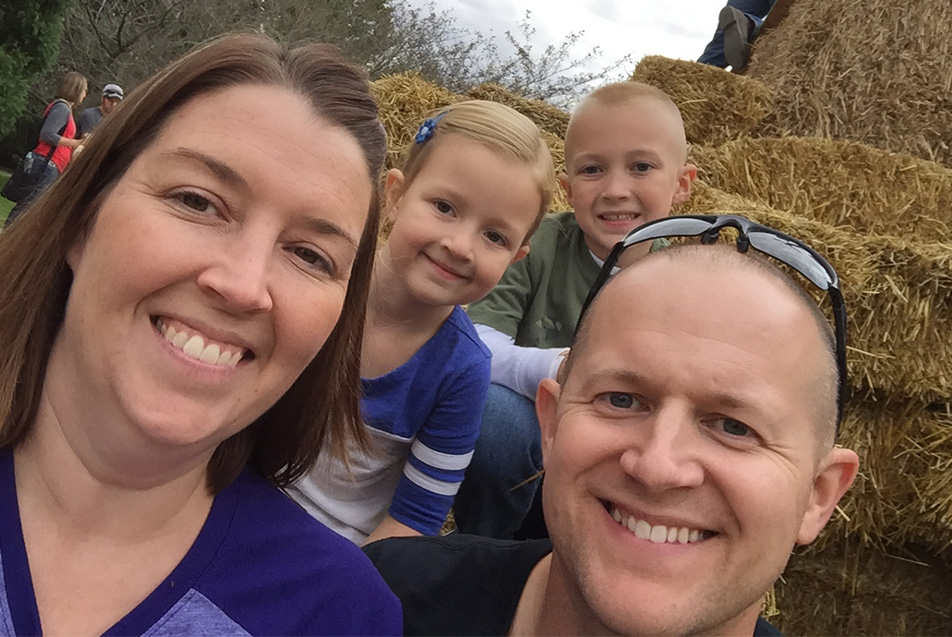
Kyle Baxter, 39, works in law enforcement for the state of Ohio. During 2018, he started experiencing consistent signs of, what he thought to be, sinus issues.
“I’d seen my family doctor in Van Wert, Ohio, and tried a few different antibiotics, but they didn’t seem to help with the symptoms I was having. In January of this year, I was referred to an Ear, Nose and Throat (ENT) specialist. He decided to order an MRI to see if he could get a better look. The MRI revealed that I had a brain tumor.”
It was a startling diagnosis for Kyle, a husband and father to two young children. “I’d be lying if I didn’t say it was devastating news,” he shared. “We didn’t know exactly what we were dealing with. The first few nights after learning of the tumor, I wasn’t sleeping well. I was anxious. I started talking with and praying to God more than I ever have in my life and at some point things clicked for me. I never found myself asking, ‘why me?’, but certainly I was asking God to help. At a certain point, I just realized I had to understand it’s all part of God’s plan for me. I changed my tune from asking for help, to asking God to use me however I could be beneficial in his work. Not to say I wasn’t still anxious or overwhelmed, but that mentality helped me deal with the situation.”
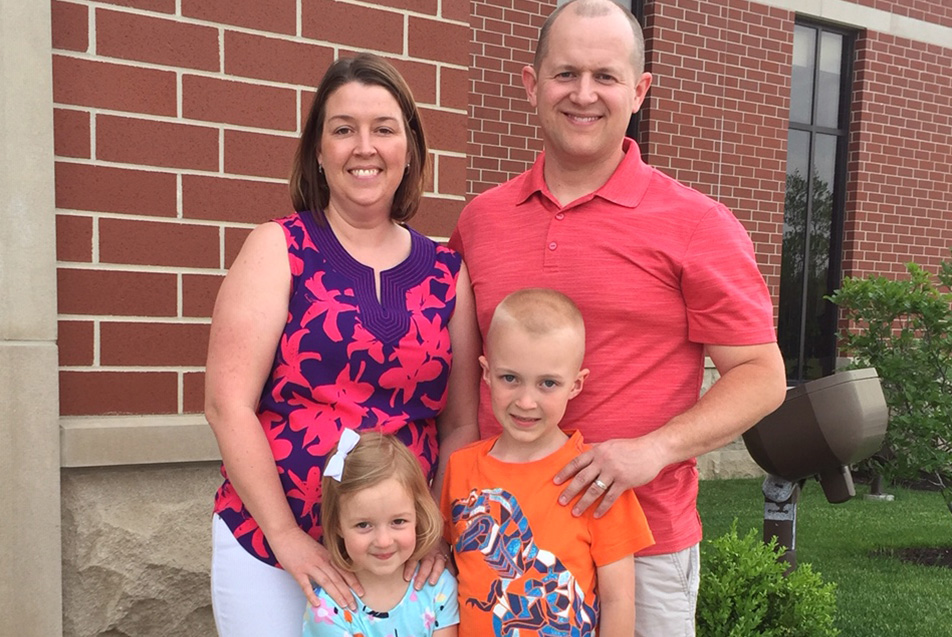
Kyle’s faith was the perfect complement to his circle of cheerleaders. “I’m so fortunate. I have a very strong family. We’re all leaning on our faith to help us cope. The support we’ve received from the community we live in, co-workers, family and friends has been amazing. It’s incredible how people show their love when you’re going through something like this.”
Kyle met with James Dozier, MD, and his staff on February 12 to begin assembling a treatment plan. “Things moved really quickly from there. On February 25, I had an appointment to discuss the surgery, and it ended up being scheduled for February 26. Looking back, I’m so glad things came together so quickly.”
Time was of the essence. “Kyle had a hemangiopericytoma,” Dr. Dozier said. “It’s a rare type of tumor involving blood vessels and soft tissues, found between the skull and brain. This is a difficult type of tumor to operate on for two reasons: 1) Its size. This was a very large tumor, causing significant pressure on the brain. It also caused swelling and loss of function. 2) It had a strong, rich blood supply.”
Dr. Dozier discussed the risks with Kyle prior to the operation. “The morning of the surgery, we tried to start the day in a normal way. We had the kids go to school. We knew I’d be in the hospital for at least a few days, and we wanted to keep some normalcy for them,” Kyle recalled. “There were some pre-op things I had to do, including another MRI for mapping. The nurse who took care of me before the surgery actually lives right around the corner from us in Van Wert! It was so neat to see a familiar face. I saw all of my family and friends before I went back, which was truly beneficial for me, but more so for my wife. Particularly since it turned into a much longer procedure.”
How long? While Kyle estimates the operation was supposed to take around 6-8 hours, it would end up being much longer, when all was said and done. “I don’t think they came out until around 2 o’clock in the morning,” Kyle said.
The process included a craniotomy, the surgical removal of part of the bone from the skull to expose the brain. The surgeon uses specialized tools to temporarily remove the section of bone called the bone flap. The bone flap is then replaced after the brain surgery has been done. The craniotomy would grant Dr. Dozier access to the tumor in Kyle’s brain so that he could remove it.
“Certainly, my body was struggling and fighting to make it through, but for my wife, family and friends, as the hours drug on, I’m sure it was hard,” Kyle said. “Physically, the procedure took quite a toll, but I can’t imagine being in their position and getting those updates.”
In the spirit of exceptional teamwork, Stephanie Falatko, DO, assisted Dr. Dozier in the procedure. “Dr. Falatko took Kyle to radiology to do an embolization, which would reduce blood flow and help control the bleeding during surgery,” Dr. Dozier said. “She also assisted in the surgery.” After nearly 14 hours in the operating room, the pair of neurosurgeons were done. The surgery had been a success.
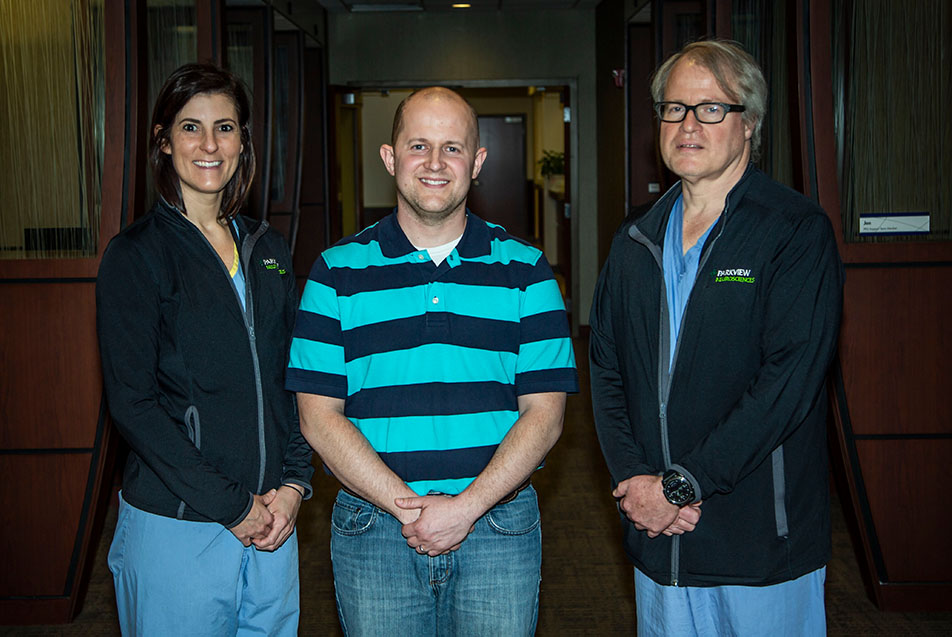
“My family told me that they lowered the sedation and had me do some testing to gauge my neurological function. I don’t recall any of it,” Kyle shared. “They asked me to write some words on paper, and my wife told me that one of the things I wrote was, ‘praise Jesus’. I knew God was with me through it all, there’s no denying that. I didn’t go through it alone.”
Kyle was gradually taken off of sedation, and made impressive progress. “The first thing I consciously remember was two days after surgery, when I was completely taken off sedation and extubated. Once the tube was out, I started improving from there, and talking with family and friends.”
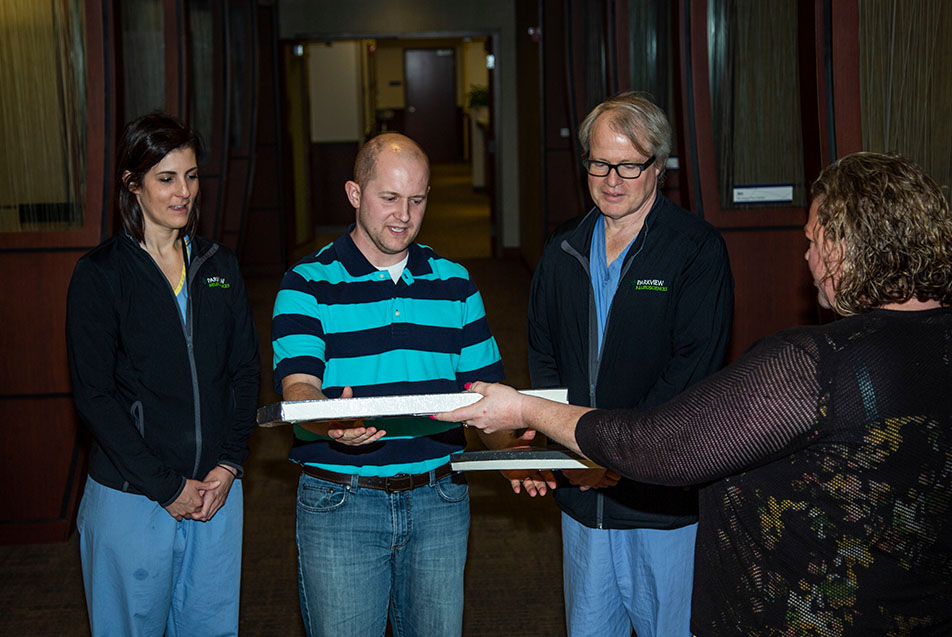
Several weeks after the first surgery, Kyle returned for another procedure in which Dr. Dozier replaced the section of skull that was removed. “Now we’re getting to the oncology part of things. I’ll be seeing Wesley Russell, MD. I’m a little anxious to start radiation. I want to get it started so that I can finish it, but I’m also just anxious to see how I’ll feel going through it,” Kyle said.
Health doesn’t come with many certainties, but Kyle is finding peace in the next phase of his journey. “The outlook is good. Hopefully, the surgery and radiation will keep things at bay. Through it all, we will continue to lean on our faith and know we placed the whole ordeal in God’s hands and see where it takes us. I’m looking forward to getting back to work or at least more of our routine.”
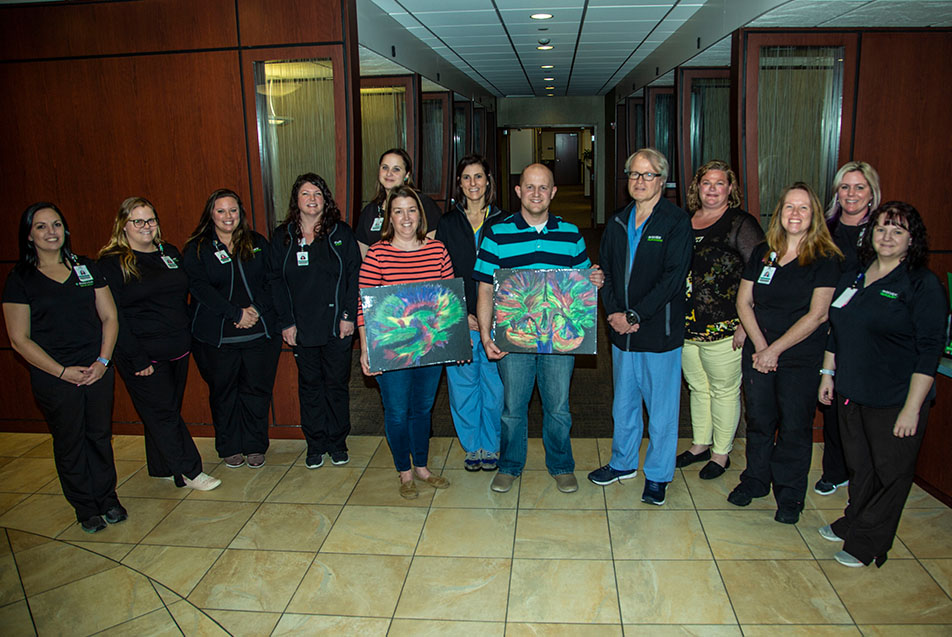
And to the doctors who spent those hours in the operating room, Kyle wishes to say, “Thank you for what you’ve done for me. That office at Neurosciences is amazing, from the person who greets you when you walk in, to the physicians. A brain tumor is a huge deal, and from the very beginning, everyone treated us well and had my best interests at heart. I know there were others in the room that day who took care of me. I can’t thank them enough. Great minds can do great things, especially with God guiding their hands. I couldn’t feel more fortunate for the team I was provided.”



